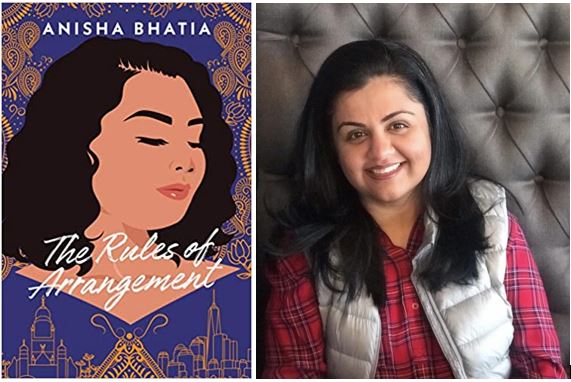BY JYOTHSNA HEGDE
The all so familiar Indian household where no-filter aunties and family members barge in at their sweet convenience, handing out unsolicited advice like Halloween candy to everyone from your parents to the housemaid, lie at the core of Anisha Bhatia’s The Rules of Arrangement, a saucy family drama surrounding the (arranged) marriage scene in bustling Mumbai city.
Bhatia’s Zoya Sahni is not exactly the archetypal “bride material” in the Indian arranged marriage (AM) market. Zoya is overweight, dark-skinned and at 26, at the very end of the age spectrum of the AM-market. That she has a great education, and a flattering career trajectory are add-ons that are nice to have but sadly fade in comparison to fashionable looks and sense of style, huge selling points for the bride’s family. Even as her family races to a find a match before her expiration date, Zoya finds herself at crossroads when she lands a dream job offer in New York City and uncovers a romance that has been brewing for a while, unbeknownst even to her.
“What have you done to your hair, Zoya? So dry. Like a carpet,” a voice and tone all too familiar in the desi family scene. A force to reckon with, the formidable Sheila Bua, the aunty no Indian family is complete without, is the team lead of project Zoya Wedding. Closely monitoring everything from Zoya’s hair to clothes and even early morning bathroom routine, Sheila bua is all set to find the elusive groom at all costs, whether it takes more coconut oil in the hair or brainwashing her family into expediting the process.
Bua finally pulls off magic from the bag of tricks, or rather bag of pictures and profiles of prospective brides and grooms, arranging for her niece to meet the very suitable boy, Lalit. The super health-conscious Lalit and his family are barely a match for the paratha and biryani-loving Zoya. But then Zoya discovers she has more in common with her boss Arnav than she could imagine.
“The trick with our traditions is to not argue,” notes Zoya, and having grown up in a joint family in India, I whole heartily agree. So even as Sheila bua’s efforts bear fruition, Zoya quietly pursues her career dreams.
Bhatia’s debut brims with the very relatable uncles, aunties, the friendly cousins, the jealous ones, the mean kind, highlighting the good, bad and ugly sides of family. In Zoya’s introspection of the people and happenings around her, Bhatia sheds light on the various ways society prioritizes a woman’s look above all else and the complex issues it breeds along the way.
While characters seem unidimensional in the beginning, we begin to learn that they are not. Bhatia brings in a few plot twists that reveal layers of different characters, including that of the Sheila bua. Zoya realizes that her bua’s past and her own present are interlinked and therein lie the answers to the choices that lie ahead of her.
The strength of Bhatia’s narrative is the effervescent imagery of India and the millions of families she houses, enhancing the flavor of the story with references to a multitude of foods her inhabitants can’t live without – samosas, chole, the chat, and the like. The lifestyles of the rich and the poor are in focus in her narrative, be it the maids who work at Zoya’s place, the office-boy “chotu”, or the elite who flaunt designer wear and drive around in branded cars– chauffeur driven, of course.
Zoya’s path to self-discovery is laced with tumultuous conflicts of Indian lifestyles that are way too complex to express in a hashtag as Zoya would in her advertising campaign. Zoya’s own insecurities about weight and color of skin exacerbated by constant, careless references to it, only make matters worse. Her struggle between western influences she lives with versus the age-old traditions embedded into her family and life are palpable. Bhatia’s use of humor and wit to convey Zoya’s predicament makes for an affable and accessible read.
A romance novel, this is not. Is the protagonist someone you look up to? Maybe not in the traditional sense, but she is the person you often find yourself to be, whether she is stress eating to overcome her insecurities, working earnestly to forge her career, or aspiring to marry for love and companionship, rather than defined social norms.
For all the western influences and lifestyles that are now part and parcel of Indian families, there is no dearth of the ubiquitous matchmaking aunties who keep this tradition alive. Despite its obvious shortcomings, customs and traditions define us as people and provide various opportunities to celebrate and stay rooted. How does young India balance the constant battle between their own preferences and traditional social expectations? Read the hilarious and relatable Rules of Arrangement to find out some of the ways the youth have their cake and eat it too.
About the Author
Born and brought up in Mumbai, India, Anisha Bhatia now lives in San Diego, California with her husband and their two children. She loves tea, biryani, books and beaches, not necessarily in that order. The Rules of Arrangement is her first novel.
SUBSCRIBE TO OUR YOUTUBE CHANNEL





